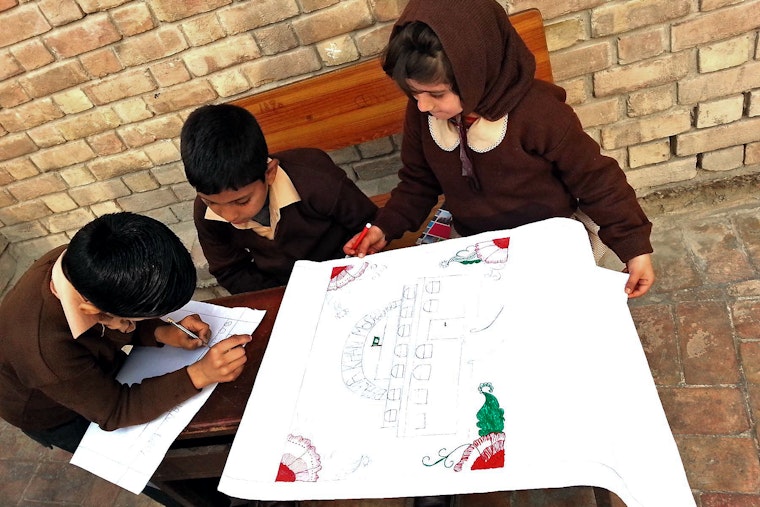Can a Chain of Progressive Schools Transform Conservative Pakistan?
By Samina Naz

Pakistan faces huge disparities in education opportunities. Low-quality schools, low enrollment and completion rates, high dropout rates, and low levels of transition to secondary education all affect girls and the rural poor in particular.
According to UNESCO’s Education for All Global Monitoring Report, there are 5.4 million children out of school at the primary level, 62 percent of whom are girls. According to some estimates, up to 25 million children ages 5 to 16 are out of school.
The problem is particularly acute in Khyber Pakhtunkhwa (KP) and the Federally Administered Tribal Areas (FATA). For this reason, the Baacha Khan Trust Educational Foundation (BKTEF) chose these regions to develop its community-based Critical Model of Education to provide quality schooling to disadvantaged children, both girls and boys.
The region faces serious developmental challenges, including a deteriorating law-and-order situation, low social development indicators, and the continuous threat of natural disasters. Religious extremism and militancy have undermined the social fabric of these communities, with women and girls facing marginalization and exclusion from basic services and opportunities.
Establishing such a school system in this context was an uphill task. Schools would need to promote peace and tolerance, fight discrimination, and teach students analytical thinking, problem solving, and literary and artistic skills. So BKTEF introduced the Critical Model of Education, which emphasizes values and ensures subsidized, quality education facilities for the poor.
The goal is ambitious: produce critical, analytical, socially, and economically productive and proactive individuals by facilitating a transition to an era of science and technology, and promote political, social, and economic development.
In KP and FATA, economic factors are one of the chief reasons students drop out. So BKTEF created a “culture education curriculum” that includes trade skills like stitching, sewing, tailoring, woodwork, and leatherwork. This opportunity for skill development encourages parents to send their children to school, reducing the dropout rate to less than five percent, as compared to more than 50 percent at other schools and 72 percent in girls’ primary schools.
So far, BKTEF has established 14 schools, a head office, and a teacher training academy. To ensure transparency in school operations, community education committees were also formed at each school. It’s a successful model that enjoys a high level of ownership by the indigenous population.
Having secured the communities’ trust, BKTEF is able to run coeducation schools in KP and FATA where, in certain places, the very concept of girls’ education goes against social norms. More than 5,000 students are enrolled in 14 schools, and 4,000 graduates are trained in leadership modules.
The Private School Management Association for the Peshawar and Swat districts signed a memorandum of understanding with BKTEF in 2015 to contract the organization’s services for teacher training. This not only helped generate revenue for BKTEF but was also a good opportunity to influence the teaching environments and methodologies across private schools through dissemination of the Critical Model of Education.
BKTEF was invited to present its Critical Model to the provincial assembly of Khyber Pakhtunkhwa in April. The legislators committed to encourage the provincial ministry of education to adopt relevant components of the model at a national level. And in March, the Education Ministry of Afghanistan requested that BKTEF bring its teacher training program and Critical Model there, too.
Change is a slow process, but its impact can last for centuries to come if the right approach is adopted.
Bacha Khan Trust Educational Foundation is a grantee of the Foundation Open Society Institute–Pakistan.
Samina Naz is a senior communications specialist for the Foundation Open Society Institute–Pakistan.